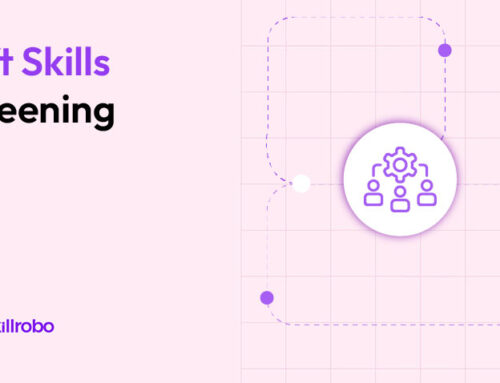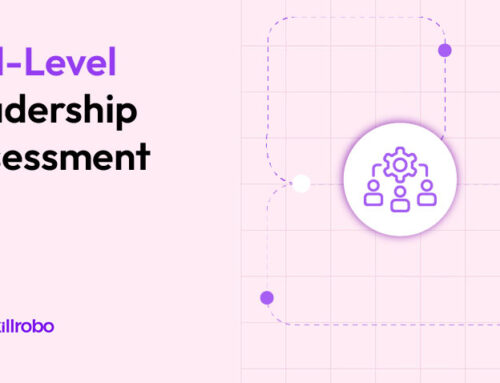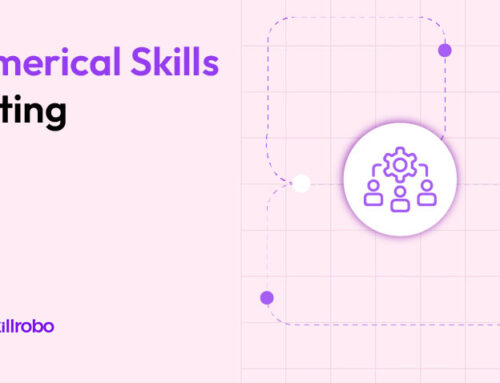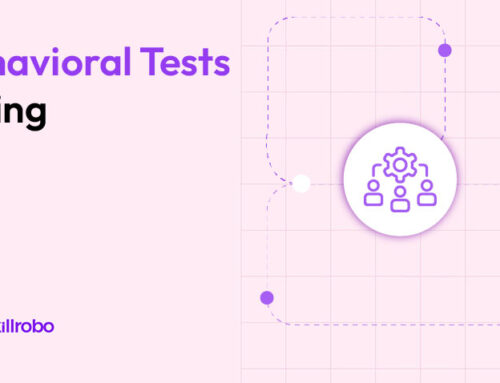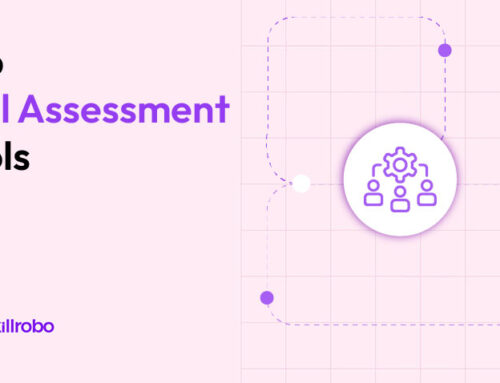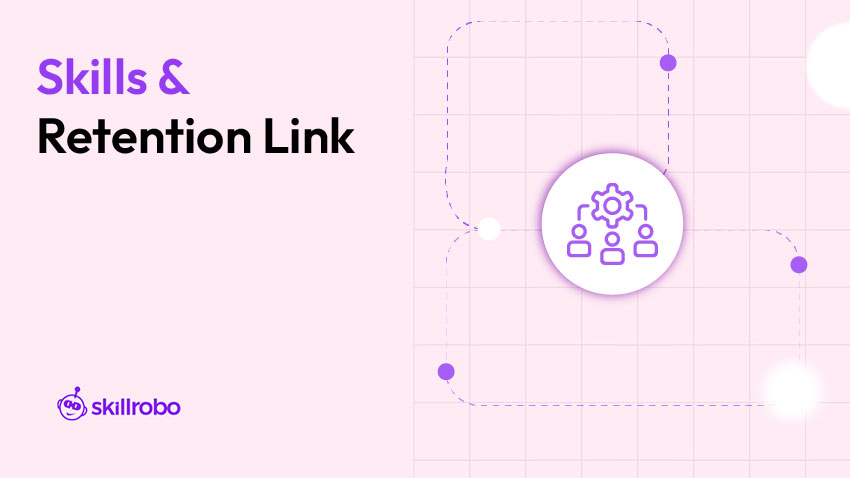
Key Takeaways
- Skill assessments reveal strengths, gaps, and development opportunities, supporting long-term employee engagement and retention.
- Targeted upskilling through assessments improves satisfaction, performance, and internal mobility.
- Continuous feedback from assessments helps employees feel valued and supported in their growth.
- Companies using skill assessments report up to 30% lower turnover and 45% faster time-to-role-fit for new hires.
Retention Is a Skills Problem, Not Just a Culture One
High employee turnover is often framed as a culture or compensation issue. While those factors matter, one of the most overlooked retention levers is role alignment, whether employees feel skilled, confident, and equipped to succeed.
Skill assessments help bridge the gap between hiring and long-term engagement. They give employees clarity about expectations, reveal development paths, and show that the company is invested in their growth.
This blog explores how integrating skill assessments throughout the employee lifecycle, from hiring to development, can significantly improve retention.
Why Employees Leave: The Hidden Skills Disconnect
Retention isn’t just about satisfaction—it’s about fit. According to internal reports from leading HR teams:
- 67% of early-stage attrition happens due to a mismatch between employee capabilities and job demands.
- Employees are 2.5x more likely to leave when they feel undertrained or out of their depth.
Without proper assessments, companies often hire based on potential but fail to identify skill gaps early. This leads to disengagement, frustration, and eventual exit. Regular skill assessments counter this by offering clarity, setting expectations, and guiding personalized development.
From Hiring to Longevity: Where Skill Assessments Make the Difference
Retention isn’t solved by one good hire; it’s built over time, across every stage of the employee lifecycle. That’s why skill assessments shouldn’t stop at recruitment. When integrated throughout onboarding, training, and development, they become powerful tools for keeping employees engaged, aligned, and continuously growing.
Instead of treating assessments as a one-time gatekeeper, forward-thinking companies use them as a long-term strategy to support both individual progress and organizational retention goals.
Here’s how skill assessments make a measurable impact from day one and continue delivering value through every phase of the employee journey:
1. Hiring the Right Fit
When assessments are used during hiring, they ensure that candidates not only meet the job criteria but are also equipped for real-world tasks. Instead of hiring based on resumes alone, companies use simulations, MCQs, and soft skill evaluations to select better-fit candidates, reducing the risk of early exits.
2. Onboarding With Confidence
Assessments during onboarding help identify where new hires need support. This enables tailored training from week one, reducing overwhelm and accelerating confidence. Employees who feel competent early are more likely to stay committed.
3. Development That Feels Personal
Ongoing assessments allow managers to assign targeted training, not blanket modules. Whether it’s Excel proficiency or cross-functional communication, aligning development with real data boosts employee engagement.
4. Internal Mobility With Data
Skill assessments help map employees to future roles. By benchmarking current abilities, companies can offer lateral or vertical moves supported by evidence, keeping top performers challenged and growing.
The Engagement Equation: How Assessments Boost Job Satisfaction
Engaged employees aren’t just “happy at work”—they feel challenged, understood, and supported in their growth. And while engagement is influenced by many factors, clarity, fairness, and feedback play a pivotal role. Skill assessments contribute to all three by providing a transparent framework for development and recognition.
1. Autonomy Through Clarity
When employees understand their strengths and growth areas, they gain a stronger sense of control over their careers. Assessment tools provide personalized data, helping individuals make informed decisions about their development. Platforms like value-of-pre-employment-assessments support this journey by offering assessments that are not just evaluative but empowering.
Autonomy drives engagement, and when employees feel trusted to own their development, they stay motivated and loyal.
2. Fair and Transparent Promotions
Promotion processes based on gut instinct or tenure often lead to dissatisfaction and perceived bias. By using data from structured assessments—especially competency-based tools—companies ensure that promotions reflect real capabilities. Tools like candidate-assessment-tools-vs-recruitment-process-outsourcing help establish merit-based advancement pathways that employees can trust.
3. Feedback That Drives Growth
Assessment data becomes more powerful when shared. Instead of reducing an employee to a single score, categorize their strengths, skill gaps, and behavioral patterns into actionable insights. This transforms performance discussions from abstract conversations into focused coaching sessions.
With tools like customer-success-manager-skills, managers can use feedback to guide upskilling efforts, track progress over time, and set measurable goals. This creates a culture where growth isn’t optional—it’s expected and supported.
Signs Your Company Needs an Assessment-Driven Retention Strategy
Retention issues often show up in operational challenges long before they’re identified as HR problems. If you’re seeing any of the warning signs below, it might be time to rethink your approach, and skill assessments could be the missing piece.
- High turnover in the first 6–12 months
If employees are leaving soon after joining, the issue may stem from mismatched expectations or poor onboarding. Integrating assessments early, like during onboarding simulations, helps identify red flags before it’s too late. Tools such as the pre-employment-testing-guide can streamline early-stage evaluations and reduce early attrition.
- Training budgets wasted on irrelevant programs
Generic training isn’t just ineffective—it’s expensive. Skill assessments help identify what an employee needs to learn, enabling HR to focus resources on high-impact areas. When you pair this with categorized data, L&D becomes laser-focused.
- Promotions are based more on tenure than capability
If tenure outweighs performance in promotion decisions, it sends the wrong message to your top performers. Structured assessments bring objectivity into the process and ensure the right people move forward, regardless of how long they’ve been around.
- Employees are unclear on what growth looks like
Without visibility into what skills matter, employees can’t visualize their next step. Assessments clarify this. They provide benchmarks and pathways that show employees what success looks like and how to reach it.
- Managers struggling to coach or set development plans
Most managers want to coach but lack the tools. Assessments offer ready-made insights, giving managers data to work with, not just intuition. This makes feedback more meaningful and development plans more actionable.
Assessments solve these by making skills visible and actionable.
The ROI of Retention: What You Save by Getting It Right
Employee turnover is expensive—far more than most companies anticipate. From recruiting and onboarding to productivity loss and morale dips, every exit drains time and money. But what’s often overlooked is how cost-effective retention becomes when driven by accurate skill assessments.
Here’s what the numbers say:
- Average cost of replacing a mid-level employee: $15,000–$25,000
- Estimated cost of upskilling an existing employee via assessment-based training: $500–$1,000
- Time saved by hiring the right fit through skill-based evaluations: up to 40% faster time-to-productivity
- Retention boost when employees follow a personalized growth plan: 2x higher engagement and 30% longer tenure
When companies rely solely on resumes or interviews, they risk costly mis-hires. In contrast, integrating skill assessments from the start not only improves hiring accuracy but also extends the employee lifecycle.
Platforms like mass hiring assessments help companies evaluate candidates at scale, reducing early churn while supporting scalable onboarding. Meanwhile, leveraging online-proctored-exam types ensures test integrity and fair evaluation, building trust from day one.
Bottom line: Assessment-led retention strategies don’t just save money, they drive sustainable performance and team stability.
Common Myths About Assessments and Retention (Myth vs. Reality Format)
Despite their growing popularity, skill assessments are still misunderstood in many workplaces. Let’s unpack the most common myths that prevent organizations from using assessments to their full potential and the realities that prove otherwise.
Debunking these myths positions your company as forward-thinking and committed to building smarter, more supportive work environments.
Skillrobo: Supporting Retention Through Targeted Assessment
Skillrobo makes it easy to design assessments that go beyond hiring and support long-term talent development. With customizable test libraries and real-time analytics, companies can build assessment journeys that evolve with the employee.
| Myth | Reality |
|---|---|
| Assessments are just for hiring. | Assessments also support internal mobility, upskilling, and retention. They’re not a one-time filter—they’re a long-term growth tool. Tools like creative sourcing strategies integrate assessments into broader workforce planning. |
| Employees will resist being tested. | When framed as developmental tools rather than gatekeepers, assessments build trust. Transparent feedback fosters motivation and growth. Pairing assessments with feedback tools ensures a positive experience. |
| We already have performance reviews. | Reviews are subjective and often too infrequent. Skill assessments provide real-time, role-specific data, adding measurable context to employee performance. |
| Soft skills can’t be measured. | False. Situational judgment tests, peer feedback, and behavioral assessments can measure empathy, leadership, adaptability, and more with high accuracy. |
Assessments are just for hiring. Assessments also support internal mobility, upskilling, and retention. They\u2019re not a one-time filter\u2014they\u2019re a long-term growth tool. Tools like creative sourcing strategies integrate assessments into broader workforce planning.
Employees will resist being tested. When framed as developmental tools rather than gatekeepers, assessments build trust. Transparent feedback fosters motivation and growth. Pairing assessments with feedback tools ensures a positive experience. We already have performance reviews. Reviews are subjective and often too infrequent. Skill assessments provide real-time, role-specific data, adding measurable context to employee performance. Soft skills can’t be measured. False. Situational judgment tests, peer feedback, and behavioral assessments can measure empathy, leadership, adaptability, and more with high accuracy.
Skillrobo helps you:
- Evaluate skills before and after hiring
- Identify development opportunities at scale
- Use data for fair promotions and internal mobility
- Retain top performers through personalized growth
From entry-level hires to mid-career upskilling, Skillrobo ensures every employee feels seen, supported, and set up for success.
Conclusion
Retention isn’t just an HR metric; it’s a reflection of how well your people are aligned, empowered, and appreciated. Skill assessments provide the structure, insight, and personalization needed to create workplaces where talent thrives and stays.
When used thoughtfully, assessments move beyond filtering candidates; they become the foundation of your employee engagement and retention strategy.Ready to retain your best talent with better data? Click here to sign up and start building your skill assessment strategy with Skillrobo.
Table of content
- Key Takeaways
- Retention Is a Skills Problem, Not Just a Culture One
- Why Employees Leave: The Hidden Skills Disconnect
- From Hiring to Longevity: Where Skill Assessments Make the Difference
- The Engagement Equation: How Assessments Boost Job Satisfaction
- Signs Your Company Needs an Assessment-Driven Retention Strategy
- The ROI of Retention: What You Save by Getting It Right
- Common Myths About Assessments and Retention (Myth vs. Reality Format)
- Skillrobo: Supporting Retention Through Targeted Assessment
- Conclusion




